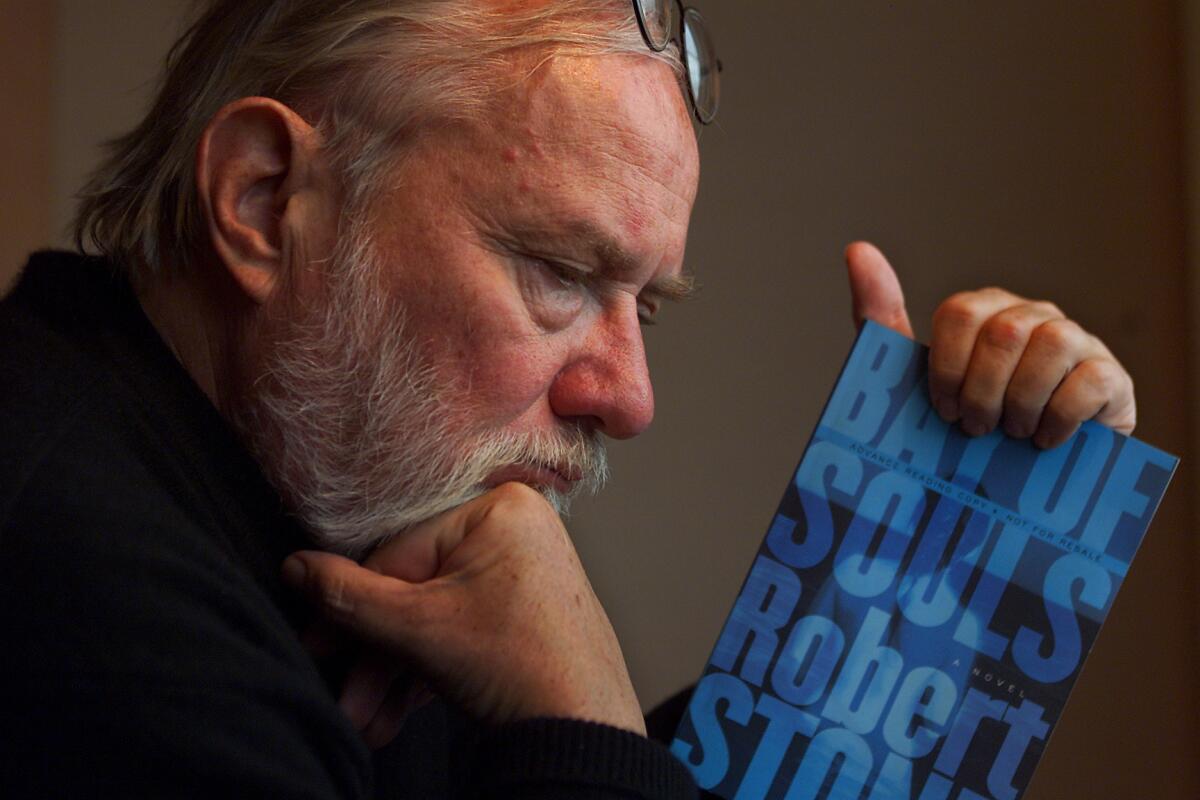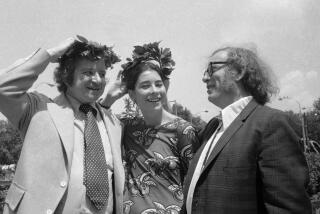Robert Stone dies at 77; novelist focused on outsiders and dreamers

Writer Robert Stone’s novel “Dog Soldiers” was awarded the National Book Award in 1975; he was a finalist for the prize three more times, for “A Flag for Sunrise,” “Outerbridge Reach” and “Damascus Gate.” He died Jan. 10 at 77.
Robert Stone, the award-winning novelist who spun out tales of seekers, frauds and other misbegotten American dreamers in such works as “A Flag for Sunrise” and “Dog Soldiers,” died Saturday. He was 77.
Stone’s death at his home in Key West, Fla., was caused by chronic obstructive pulmonary disease, his literary agent, Neil Olson, told the Associated Press.
An adventurer who in his 20s befriended Ken Kesey, Neal Cassady and what he called “all those crazies” of the counterculture, Stone had a fateful affinity for outsiders, especially those who brought hard times on themselves.
Starting with the 1966 novel “A Hall of Mirrors,” Stone set his stories everywhere from the American South to the Far East and masterfully made art from his characters’ follies, whether the adulterous teacher in “Death of the Black-Haired Girl,” the fraudulent seafarer in “Outerbridge Reach” or the besieged journalist in “Dog Soldiers,” winner of the National Book Award in 1975. “A Flag for Sunrise,” published in 1981, was a finalist for the Pulitzer Prize.
Stone’s face — well-lined and framed by a weathered beard — was a testament to a life fully and painfully lived. He was a neglected and traumatized child who learned early not to trust reality, a lapsed Catholic consumed by questions of sin and redemption. Inspired to write novels after re-reading “The Great Gatsby” in his 20s, he identified so strongly with his characters that he once broke down sobbing, at a college library, while working on “Dog Soldiers.”
“Writing is how I justify my existence,” he told the AP in 1992. “This is a basic hunger for most people; they want their suffering to mean something. You go through all these things and the idea it’s utterly of no consequence is very difficult to work with.”
Stone’s books also included the novel “Damascus Gate,” another story of a wayward journalist, this time in the Middle East; “Children of Light,” the fictional saga of a drunken screenwriter in Mexico; and a memoir about his years with Kesey and friends, “Prime Green: Remembering the Sixties.” He helped write screenplays for adaptations of “Hall of Mirrors” (retitled “WUSA” and starring Paul Newman and Joanne Woodward) and “Dog Soldiers” (released as “Who’ll Stop the Rain” starring Nick Nolte and Tuesday Weld).
Born in New York City on Aug. 21, 1937, he was abandoned by his father and sent to a Catholic orphanage after his mother, who suffered from schizophrenia, was institutionalized. A loner as a boy, he joined the Navy at 17. By his mid-20s, he was living in New Orleans, dropping acid when he should have been working on a book and selling Collier’s Encyclopedias in rural areas not far from the city.
There were times he and his salesman buddies were jailed in small towns as suspected agitators.
“We had to get the Collier’s lawyers to come spring us,” he told the AP. “And sometimes we didn’t know if they were going to beat us to death, or if they were going to buy us coffee.”
After New Orleans, he moved to the Bay Area, met Kesey and friends and, like so many of his peers in the ‘60s, set out to “discover America.” Stone would begin sharing what he had seen and done with “A Hall of Mirrors,” a surreal tale of corruption, decadence and breakdown in New Orleans.
Stone is survived by his wife, Janice, with whom he had two children. Olson said he had been working on a novel at the time of his death, but had no comment on whether the book would be published.
Italie writes for the Associated Press
More to Read
Start your day right
Sign up for Essential California for the L.A. Times biggest news, features and recommendations in your inbox six days a week.
You may occasionally receive promotional content from the Los Angeles Times.






